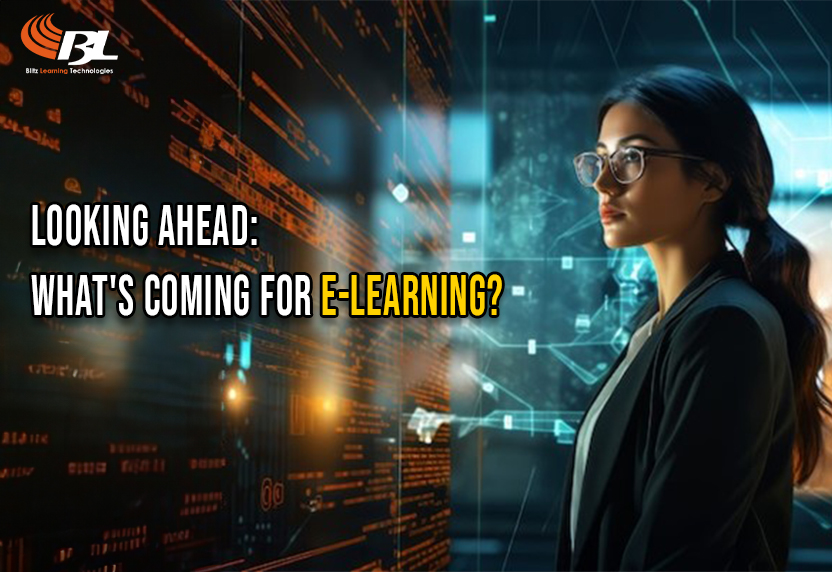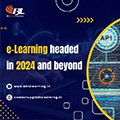
Blog
- Home
- Blog

09Sept
Looking Ahead: What's Coming for eLearning?
Introduction
In today’s fast-paced corporate environment, staying ahead in eLearning requires a deep understanding of emerging trends and technologies. As the landscape of workplace training continues to evolve, your company needs to stay informed and adapt. Let's look at the transformative developments that will shape the future of eLearning.
1. Data-Driven Decisions: Improving Training Results
Companies can't just trust their gut when it comes to training choices anymore. Smart software now let’s businesses keep an eye on how well people are learning how interested they are, and how they're doing all as it happens. Take compliance training, for instance. These programs can use data to spot where workers find it tough to follow the rules. This allows quick changes and focused help. Using data helps make training plans better. It makes sure your programs tackle skill gaps and boost overall work quality.
2. Prioritizing Inclusivity and Accessibility
Making training materials accessible to all employees is essential. eLearning platforms now include features like screen readers, subtitles, and content in multiple languages. Take onboarding modules for new hires as an example. These can be created to meet diverse learning needs offering materials in different languages and formats. This approach supports a broader range of employees, no matter their backgrounds or abilities, and helps create a fairer workplace.
3. AI-Powered Learning: Customizing Corporate Training
AI has an impact on corporate eLearning by bringing in adaptive learning tech. AI systems tailor training experiences to individual needs using real-time data. Take a compliance training module powered by AI. It can tweak how hard the tests are based on how well an employee does. It also gives extra help to those who need it. This personalized approach boosts engagement and helps people learn better. As a result, AI proves itself a key player in today's corporate training world.
4. Immersive Learning with AR and VR
AR and VR have an impact on corporate training by creating immersive learning environments. These technologies enable employees to interact with complex scenarios in a virtual setting. For example, they can simulate emergency response drills or navigate intricate machinery. AR and VR make training more engaging and practical by offering hands-on experiences. This leads to better retention and application of knowledge.
5. The Rise of Microlearning and Bite-Sized Content
Packed work schedules make microlearning valuable for employees. This approach delivers content in small easy-to-grasp chunks. Companies now use eLearning platforms to offer brief targeted lessons. These cover topics like updates on compliance or skills for software use. Microlearning suits people with short attention spans. It lets workers fit learning into their daily tasks. This boosts how much they remember and how well they perform.
6. Gamification: Boosting Engagement Through Interactive Challenges
Gamification brings game features into company training making it more fun and engaging. By adding interactive challenges, leaderboards, and rewards, gamification has an impact on motivation and participation. Take onboarding programs, for example. They can use game-like elements to help new employees finish training modules keep tabs on their progress and get badges for hitting milestones. This leads to a more lively and effective way to learn.
7. Blockchain to Verify Secure Credentials
Blockchain has an impact on corporate eLearning by offering a secure way to verify digital credentials. This system spreads out keeping certifications and training records safe, cutting down on fraud, and making it easier to check. For instance, using blockchain to check completed compliance training makes sure certifications are real and trustworthy boosting confidence in what employees can do.
8. Learning and Growing Skills All the Time
In today's fast-changing job world, learning all the time is key. New eLearning platforms give flexible ways to learn that help employees grow their skills and move up in their careers. For example, workers can tap into many courses and tools to stay on top of what's new in their field and pick up new skills helping them stay competitive and able to adapt in their jobs.
Conclusion
In the rapidly evolving corporate training landscape, embracing emerging eLearning trends is crucial for staying competitive. Data-driven insights, inclusivity, AI-powered customization, and immersive technologies like AR and VR are transforming how we approach employee development. Additionally, microlearning, gamification, and blockchain enhance engagement, accessibility, and security. As these advancements shape the future of workplace training, companies must adapt and leverage these innovations to optimize learning outcomes and support continuous employee growth.

Neha Khare
About authorNeha Khare specializes in designing engaging and effective learning experiences tailored to learners' needs and also creates insightful blogs on corporate e-learning. She develops creative instructional methods, integrates multimedia, and aligns content with learning goals. Neha's innovative techniques and blog contributions significantly enhance the quality and impact of corporate training programs.



Leave a comments